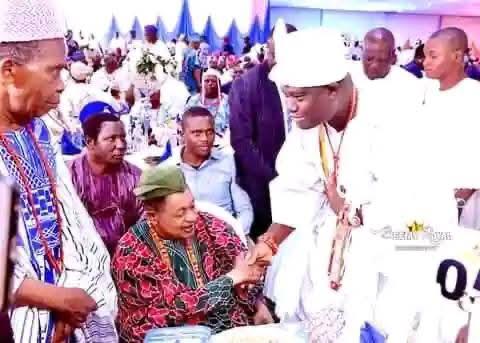April 30, 2025
By Ayinde Adeleke
The Oyo Alaafin in the Diaspora (OAITD) has firmly addressed the growing debates around Yoruba royal protocol, particularly claims that the late Alaafin of Oyo, Oba Lamidi Olayiwola Adeyemi III, ever rose in deference to the Ooni of Ife.
The group insisted that such claims contradict historical records and traditions handed down over centuries.
According to the OAITD spokesperson, Engr. Prince Afolabi Aderemi, a closer examination of history, supported by documented evidence, reveals that the Alaafin does not and has never stood for any other monarch, including the Ooni.
“The Alaafin of Oyo occupies a unique position in Yoruba history. As the direct descendant of Oranmiyan and the custodian of the Oyo Empire’s legacy, the Alaafin’s throne is one of immense prestige,” Aderemi said.
He explained that historically, the Alaafin was regarded as the political head of the Yoruba people, while the Ooni of Ife remains the spiritual leader.
This distinction in roles has always dictated royal etiquette.
“Photographs and oral traditions spanning decades confirm that the Alaafin does not rise for any other king, including the Ooni.
“This is not a sign of disrespect but rather an affirmation of the distinct hierarchies and customs that have governed Yoruba royalty for centuries,” Aderemi added.
The OAITD emphasized that the late Oba Lamidi Olayiwola Adeyemi III, a deeply traditional monarch, upheld this practice throughout his reign, as did his predecessors.
“Those familiar with Yoruba history will recall that even during joint public appearances, the Alaafin maintained his seated position when the Ooni or other monarchs entered. This is not an isolated occurrence, but a consistent practice rooted in the Alaafin’s historical status,” Aderemi stated.
He insisted that the Alaafin’s protocol never signified disrespect or disunity, saying, “The Alaafin’s refusal to stand for any other monarch is not an act of defiance but a reaffirmation of the distinct roles each Yoruba king plays in the cultural and political tapestry of the Yoruba people. History spanning hundreds of years cannot be rewritten in a stance.”
Aderemi also provided historical context, referencing the Oyo Empire’s dominance in earlier centuries.
“The Oyo Empire’s influence, at its peak, extended across vast regions, and the Alaafin’s authority was unquestioned in matters of governance and military command. In today’s democracy, to suggest that Alaafin Abimbola Akeem Owoade I would stand for another king disregards the well-documented protocols of Yoruba royalty,” he said.
Describing Oba Adeyemi as a guardian of culture, Aderemi stated, “The late Alaafin Adeyemi III, a scholar of history and tradition, was meticulous in preserving the dignity of his office.
“His actions were always in alignment with the customs handed down through generations.”
